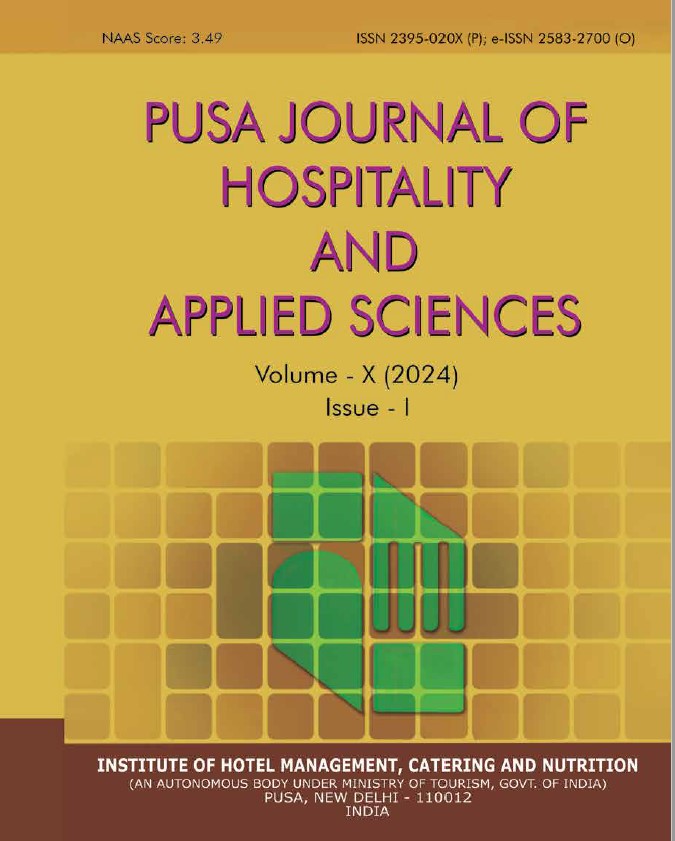Association Between Locus Of Control And Work Satisfaction
DOI:
https://doi.org/10.48165/pjhas.2023.9.2.6Keywords:
Locus of Control, Hotels, Hospitality, Experience, Work SatisfactionAbstract
Background: Work satisfaction or job satisfaction is an important factor for any organization to ensure low employee turnover and promote their company via their employees as a good place to work. As per many researches, there is a direct relationship between Locus of Control (LOC) and Work Satisfaction Level. Objectives: The objectives of this study were: (i) to identify the association between Locus of Control of hospitality professionals and years of experience; (ii) to identify the work satisfaction or job satisfaction levels of hospitality professionals; and (iii) to identify the association between Locus of Control and Work Satisfaction levels of hospitality professionals. Methodology: The present descriptive research was conducted on 103 hospitality professionals of Delhi-NCR region. The sampling technique was convenience sampling. To measure Locus of Control, two existing tools were used as a reference to develop a new similar tool and to measure the Job Satisfaction levels of hospitality professionals, eNPS i.e., Employee Net Promoter Score was used. Mean, SD, Percentage, z-test and Pearson’s Correlation Coefficient were applied for statistical analysis and the data was analysed based on ‘years of experience.’ Results: The results of eNPS showed that 43.69 % of the respondents were Promoters, 40.78 % of the respondents were Passives and 15.53 % of the respondents were Detractors. Mean Job Satisfaction Levels of Hospitality Professionals came out be 7.94 ± 1.79 (out of 10) indicating that mean respondents are Passives. z-test was done at 1% level of significance to test the hypothesis for association between Locus of Control (LOC) and years of experience, for which, null hypothesis was rejected [calculated value of z = 4.228 at 1% level of significance which is greater than 2.58 (critical value of z)], hence, proving that there is a significant difference in the Locus of Control of hospitality professionals with over 5 years of experience and those with less than 5 years of experience. Pearson’s Product Moment Correlation Coefficient was calculated to recognize the association between Locus of Control (LOC) and Work/Job Satisfaction levels, for which the value of r = -0.069 indicating that there is no correlation between the two variables. Conclusion: It can be concluded from this study that personality type (Locus of Control) individually is not the deciding factor for job satisfaction levels of hospitality professionals but maybe the result of other factors.
References
Bathena, Z. (2018, March 18). Why Job satisfaction is an Important Phenomenon of the Vicious Circle? Retrieved from https://www.entrepreneur.com/article/310608
Cherry, K. (2019, December 7). Locus of Control and Your Life. Retrieved from https://www.verywellmind.com/ what-is-locus-of-control-2795434
Dhoundiyal, A. and Mathur, D. (2021). “Impact of training on employee satisfaction: an empirical study with special reference to fresher’s from hotel schools employed in the hotels of mumbai and its suburbs. Pusa Journal of Hospitality and Applied Sciences. Volume 7, Issue I. RP
pdf (ihmpusa.net)
Frucot, V. T., & Shearon, W. T. (1991). Budgetary Participation, Locus of Control, and Mexican Managerial Performance and Job Satisfaction. The Accounting Review, 66(1), 80- 99. Retrieved from https://www.jstor.org/stable/247707.
Grierson, K. (2018, February 27). Understanding the Relational Locus of Control. Retrieved from https:// kgrierson.com/uncategorized/understanding-relational locus-control/
Joelson, R. B. (2017, August 2). Locus of Control. Retrieved from https://www.psychologytoday.com/us/blog/ moments-matter/201708/locus-control
Lee, K. (2005). The effects of locus of control and organizational structure on job satisfaction and turnover intention of hotel managerial employees (Unpublished doctoral dissertation). Graduate College of the Oklahoma State University. Retrieved from https://hdl.handle.
net/11244/7245
Mahajan, N., & Kaur, J. (2012). Relation Between Locus of Control of College Teachers and Their Job Satisfaction. International Journal of Applied Psychology, 2(5), 98- 103. doi:10.5923/j.ijap.20120205.04
Salazar, J., Hubbard, S., & Salazar, L. (2002). Locus of Control and Its Influence on Hotel Managers Job Satisfaction. Journal of Human Resources in Hospitality & Tourism, 1(2), 15- 26. doi:10.1300/J171v01n02_02
Sherman, T. M., & Giles, M. B. (1981). The Development
PUSA Journal of Hospitality and Applied Sciences ISSN 2395-020X (P); e-ISSN 2583-2700 (O)
; 9(2) : 48-53
and Structure of Personal Control in Teachers. The Journal of Educational Research, 74(3), 139-143. doi:10 .1080/00220671.1981.10885299
Singh, A. P., & Dubey, A. K. (2011). Role of Stress and Locus of Control in Job Satisfaction Among Middle Managers. The IUP Journal of Organizational Behavior, 10(1), 42- 56. Retrieved from https://papers.ssrn.com/sol3/papers. cfm?abstract_id=1788003.
Surbhi (2017, November 25). Job Satisfaction. Retrieved from https://businessjargons.com/job-satisfaction.html
; 9(2) : 48-53
Vijayashree, L. V., & Jagdischchandra, M. V. (2011). Locus of control and job satisfaction: PSU employees. Serbian Journal of Management, 6(2), 193-203. doi:10.5937/ sjm1102193V
Yemen, G., & Clawson, J. G. (2003). The Locus of Control. Retrieved from https://faculty.darden.virginia.edu/ clawsonj/General/SELF_ASSESSMENT_TOOLS/ OB786_Locus_of_Control.pd




